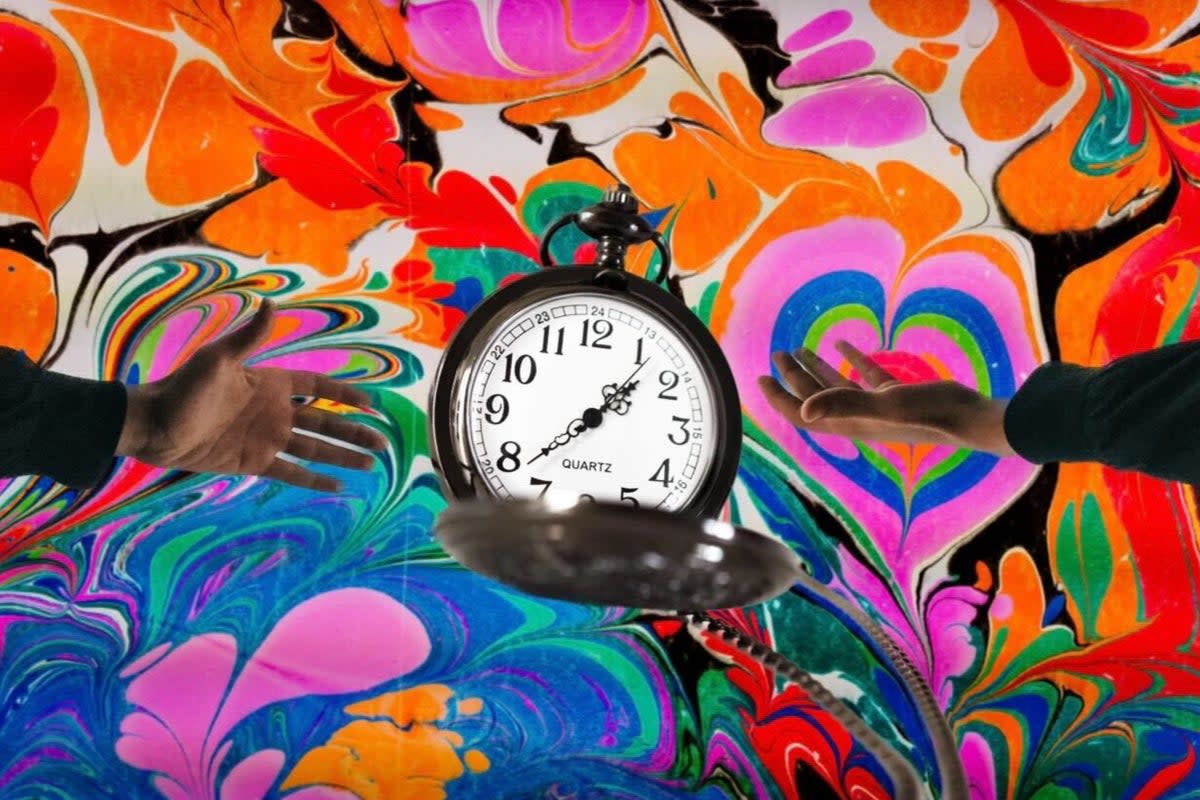How hypnotherapy cured my binge drinking

Jacked into my headphones, I’m lying corpse-like on the sofa, acutely aware that passersby might assume I’m having an afternoon nap/stroke. A soothing voice is instructing me to rub my arms from shoulder to elbow and fix my pupils on a comfortable spot on the ceiling before I close my eyes and begin to count backwards, visualising myself walking down a set of stairs and out on to a beautiful garden bathed in kaleidoscopic colours.
Sixty minutes of fuzziness follows. There’s something about pebbles dropping into a pond; a playful, confident child (me) playing on a swing; a new door that seems to lead to exciting opportunities.
These were my first steps to (almost) sobriety – and after decades of downing three too many, I was ready to make the leap.
As a child of the 80s, my teenage years were a blur of WKD Blues and garage music. Four nights a week were spent in neon-lit clubs, swigging alcopops and vinegary wine to the dance-floor beats of Artful Dodger and Bobby Brown. Regular blackouts prevented me (sometimes mercifully) from remembering the night before and no matter how many times I staggered or slurred, I always wanted ‘one more glass’.
Fast-forward to my mid-thirties and drinking had become a habitual nightly routine. One large glass of red with dinner had slowly morphed into two. Soon enough I was quaffing an entire bottle of Malbec on a Monday evening – and sleepwalking my way through the week in a foggy, hungover haze.
Soon enough I was quaffing an entire bottle of Malbec on a Monday evening
Extreme? The latest stats from Public Health England suggest not: the hangover of post-pandemic stress and the cost-of-living crisis has resulted in alcohol sales soaring by 25%, and research conducted by Alcohol Change UK – the brainchild behind Dry January – reveals that almost 9 million people planned to park the pinot and kick-start 2023 with sobriety – the highest number ever recorded since the campaign launched in 2013.
But here’s the thing: controlling your intake is hard, especially if you’ve historically leant on liquor all-year round and now want to reset your relationship with alcohol entirely. Going teetotal, of course, makes sense: you’re eradicating temptation by taking yourself out of the game. But, for me, the thought of forgoing an occasional glass of red with a Sunday roast didn’t feel right either. I wanted the holy grail: I wanted to drink in moderation. And I found the perfect hack in hypnotherapy.
‘My clients tell me it’s the same feeling as having too many cups of tea – when you’re offered another one, you simply say you don’t fancy it because you genuinely don’t,’ explains Ailsa Frank – a leading UK-based hypnotherapist with a proven track record in addressing the nation’s drinking problem.
‘Hypnotherapy is just a relaxation tool that allows you to access a memory bank – the part of your brain that stores habits – so that you can break them and build new ones. Where it differs to will power is that it alters your conscious mind and your subconscious. That’s why people who complete Dry January or Sober October often struggle to keep up good habits; they may have altered their conscious mind, but they haven’t reframed their relationship with alcohol in the subconscious – and if both parts of the brain don’t match, you won’t truly break the habit. In fact, you might even end up drinking more the rest of the year and undoing all that hard work,’ Frank adds.
Not keen on schlepping your way into town for sessions? Fear not: many hypnotherapists now run courses over the phone or online. And you won’t need to remortgage to fund expensive treatments, either. Over the course of six weeks, I received two further 60-minute, one-to-one phone sessions with Frank (£175 each) and listened to a 10-minute relaxation recording via her Feel Amazing app each night before bed (membership starts at £35 or you can download selected tracks for free). That was three years ago, and the legacy of my hypnosis has been truly life-changing: I’ve not binged (or blacked out) since.
Hypnotherapy can quickly reframe your thoughts and reset your habits
‘We live in uncertain times and the pandemic has heightened our experiences of stress, grief and loss, which is why so many people turn to drinking in the first place,’ explains Franks. ‘But hypnotherapy can quickly reframe your thoughts and reset your habits to help you create a happier, more balanced life – no matter what obstacles you face. It’s a very effective tool for anyone wanting to take control of their drinking.’
It certainly worked for me: my once-toxic relationship with alcohol has gone through an unequivocal break-up. And I’m perfectly happy to raise a (small) glass to that.

 Yahoo News
Yahoo News 
